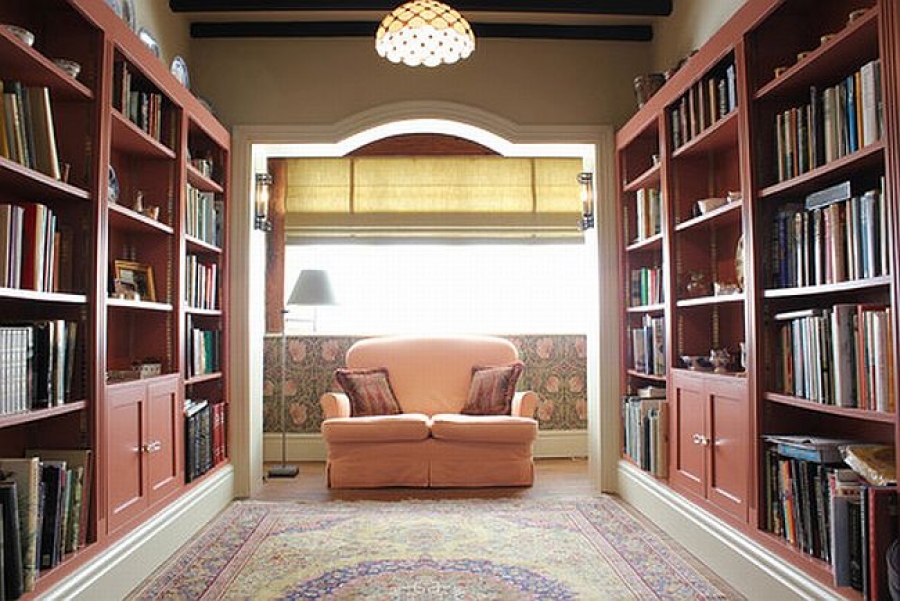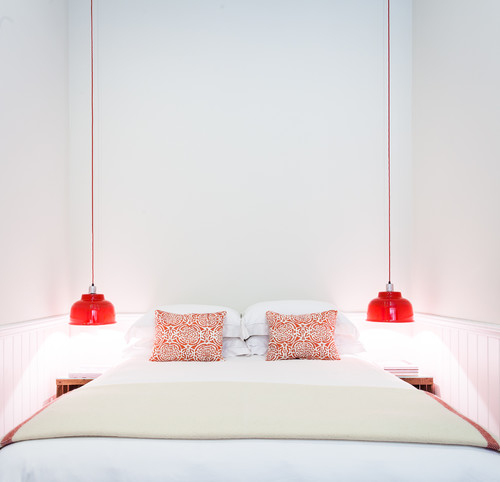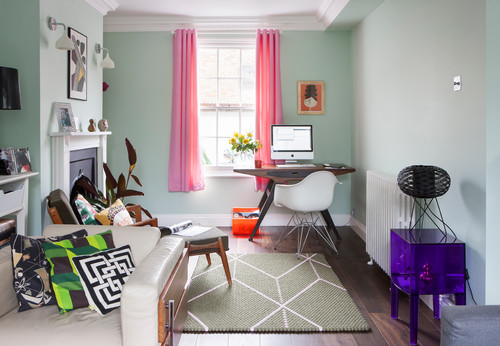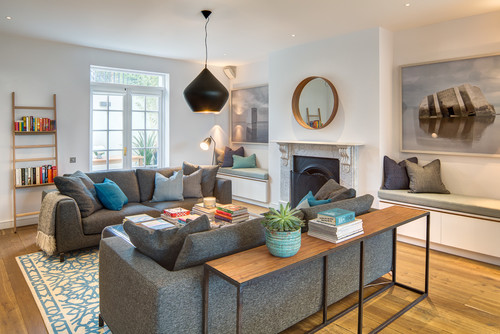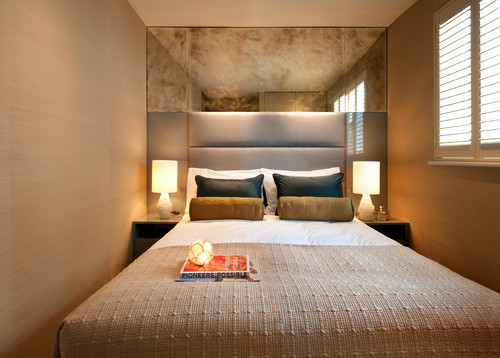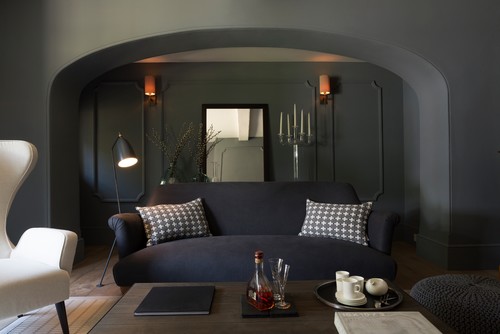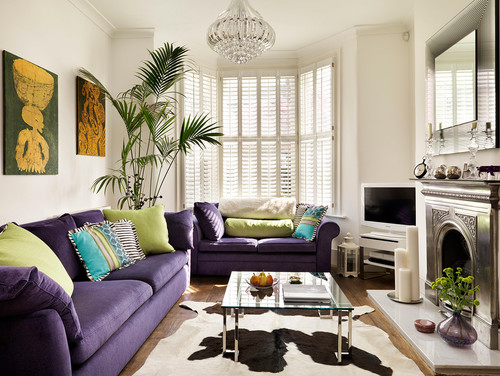Distract attention away from an awkward room shape and create a pleasing design using these pro tips.
When you're clicking through images of gorgeous rooms to gather inspiration for your home, does it sometimes seem as though the ideas will work only in large or pleasingly proportioned rooms? The truth is, when a room is well designed, we don't notice when it's awkwardly shaped. Here, three interior designers share their tips for dealing with a common type of awkward space - a long, narrow room.
"The challenge you face with a long, thin living space is to ensure the room feels welcoming, inviting and free flowing," says Letiche Black of Amberth. "You want to avoid it looking too static or formal."
Make sure the seating area doesn't feel too far away from the TV and other necessities.
"The biggest challenge will be not to feel obliged to push everything against the walls, because you will only emphasize the narrow shape and corners and be left with a slim walkway," she says. "The space will feel tight and cramped instead of open and light."
Diana Greenhalgh of My Bespoke Room suggests creating areas of color, as in this room. "These will draw the eye to certain points around the room to help break up the space," she says.
Maximize space with style. Greenhalgh suggests making a feature of details that will maximize the feeling of space in a narrow room. "Space-saving solutions such as small shelves instead of bedside tables, and hanging pendant lights instead of bulky bedside lights, can help make the most of the available space, and also assist by creating an interesting focal point," she says.
Focus on lighting. In a long, thin living area, Black recommends putting seating areas near the main natural light source. "This will influence how you design the rest of the space and encourages a loose placement of other furniture," she says. "Position armchairs away from the wall, as this tricks the eye into believing the space is much wider."
Section it off. "Break a long room into sections by cleverly placing furniture," says Charlotte Ford of Cotton Tree Interiors. "Console tables are really useful when placed at the back of a sofa," she notes. "And if possible, get some floor-mounted sockets, so lamps can be put on them to bring in subtle lighting and create a soft divide." She also advises looking at the size of your furniture. You can buy slimmer sofas and other scaled-down pieces that will fit well in the space.
Take the textural route. Black suggests introducing plenty of texture into a thin room. "Create layers and warmth that will allow your senses to be met with an arrangement of smooth, rough and shiny surfaces, instead of lonely corners," she says. "Use mirrors too, as these will help the space to feel wider." In a bedroom, Greenhalgh advises considering the position of the bed with care, as it will probably be the focal point. Placing a bed at the end of a narrow space, as seen in this room, plays up the room's shape in a stylish way.
Open up. In a narrow bedroom, Black says, choose colors that make the space feel wider and brighter. "It is important to be mindful of the space as a whole, ensuring one end doesn't get neglected or feel darker than the other," she says. "Don't be tempted to simply position your bed, desk and other furniture all down one wall, as you will only add emphasis to the long, narrow shape of the room." She suggests using warm, light grays, off-whites and whites. "These shades instantly create a brighter, more open space," she says.
Distract the eye. "Use neutral window treatments, as drawing attention to the boundaries at either end of the room only emphasizes its shape," Ford says. "Use pattern, texture and color on occasional chairs, cushions, lampshades and art and also carefully positioned wallpaper, all of which take the focus off the shape of the room and direct it on to the more interesting objects."
Find your focal point. One of the difficulties in decorating a narrow room is deciding where the focus of the space should be, Ford says. If you are working with a builder, ask to create subtle room dividers. "Full-length narrow columns break up the room, giving a natural finishing point when using different wallpapers and paint colors," she says.
Don't be afraid of the dark. "If the room is dark due to lack of windows," Greenhalgh says, "go with it and embrace a dark color palette to make the space cozy, rather than trying to fight it."
Go round. Choosing accessories in shapes that go against the linear nature of a long room — such as circular forms — is another trick to visually widen a space. "Avoid stripes, as these will only enhance the long, thin feel," Greenhalgh says.
Avoid the "corridor effect". "Choose items that can be positioned to break up the feeling of a long, thin room, such as small coffee tables, side tables or armchairs," Greenhalgh says. "Break up the corridor effect by positioning pieces of furniture in clusters, instead of in a row." This tricks the eye into seeing a wider space. "For example, pick different seating options and arrange them together, instead of having just one long sofa against the long wall," she says. And don't be afraid to use bold furnishings, fixtures and fittings, Black advises, noting that they will add visual interest.
Light it right. Bedroom lighting needs to be well considered in a narrow space, as there often isn't sufficient surface area for table lamps. Ford suggests installing downlights, as they spread the light across the room. Then, if you have the luxury of enough space, "have a softer, secondary lighting plan with a combination of bedside lamps, reading lamps and table lamps," she advises. Wall-mounted reading lights can also help to declutter bedside surfaces where space is tight.
Get horizontal. When deciding on the position of the bed in a narrow room, if space allows, "break up the space by positioning the bed across the width of the space instead of up against the length of one," Black says. Sometimes, however, you have no choice but to position the bed going with the length of the room and facing the door. And there are benefits to that. "It feels welcoming and will take your eye off the shape of the room," she says. "Especially if you use lots of pillows to add comfort and warmth."
Also See:




